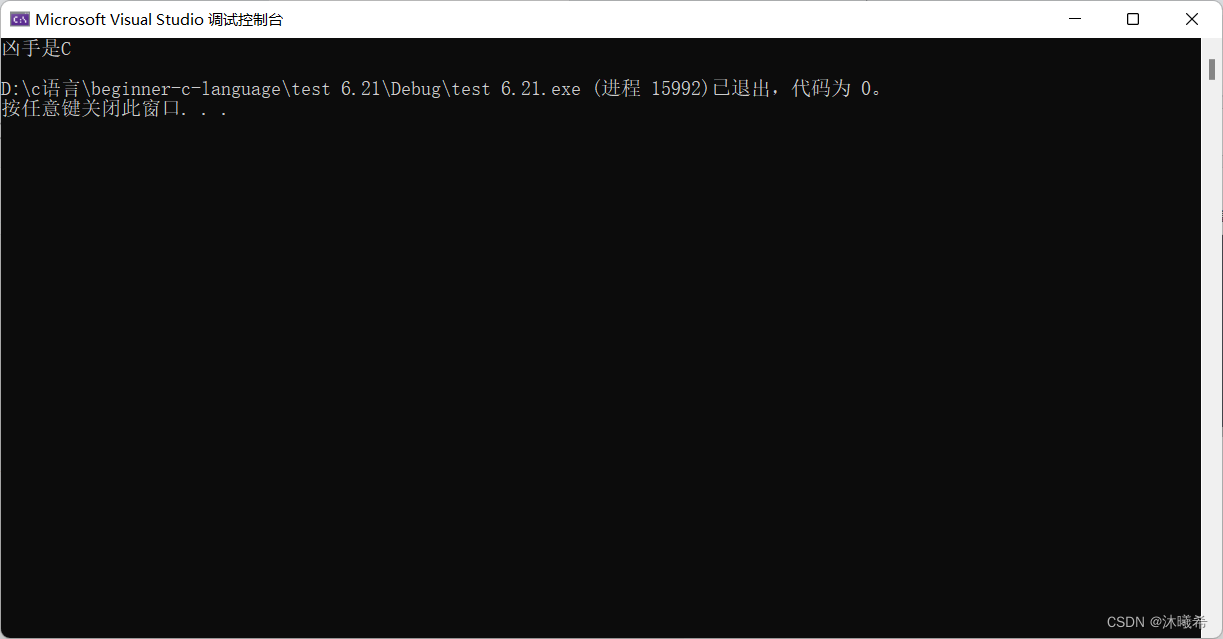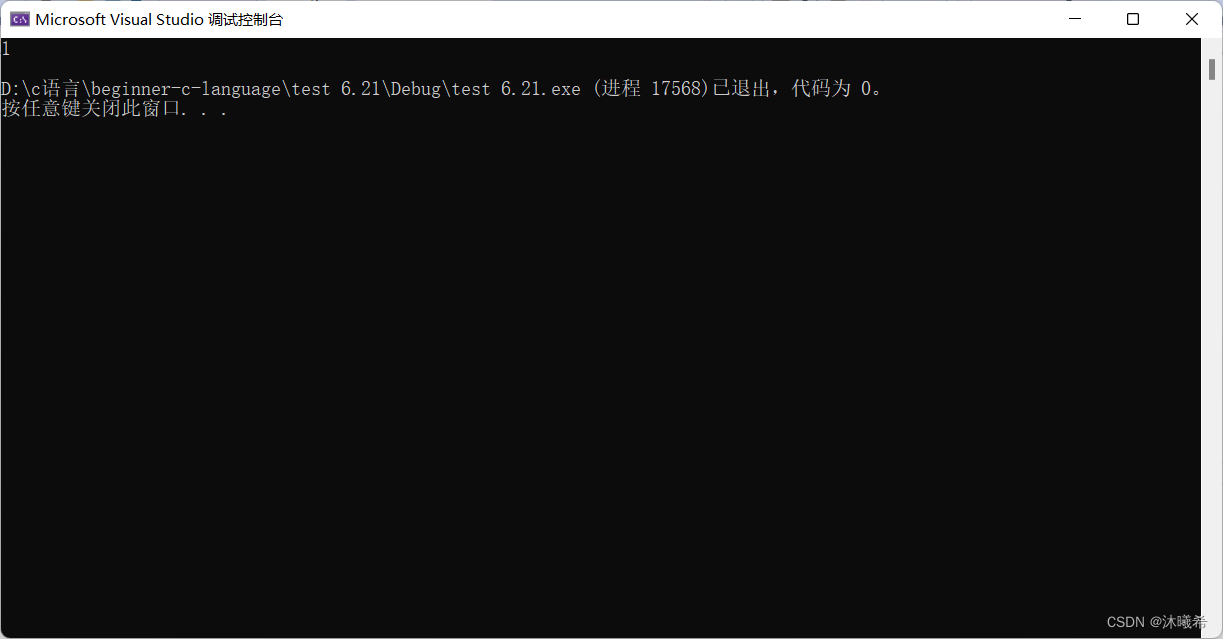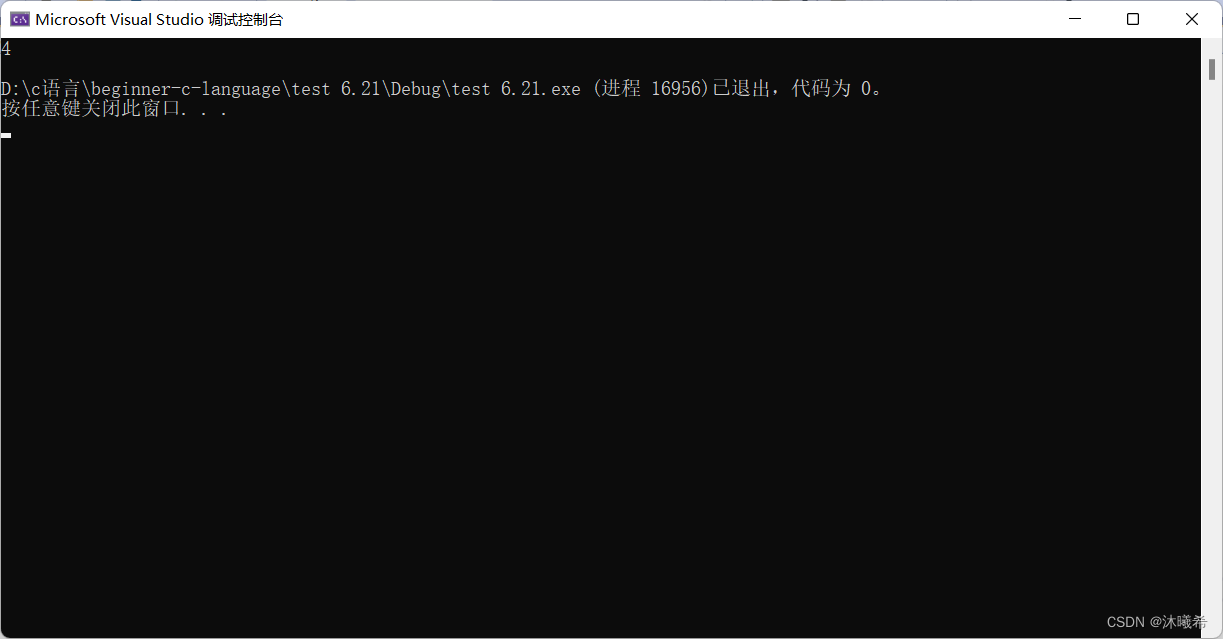大家好我是沐曦希💕
文章目录
- 🎇if else 组合
- 🔭什么是语句
- 🎆什么是表达式
- 🎡基本语法
- 🎉if语句实现猜凶手
- 🚗bool 变量与"零值"进行比较
- 💫深入理解C 中 bool
- 🎆bool 值与0比较
- 💥写在最后

🎇if else 组合
🔭什么是语句
C语言中由一个分号;隔开的就是一条语句。
例如:
printf("hahan");
int a = 10;
int b = 20;
int c = a + b;
🎆什么是表达式
C语言中,用各种操作符把变量连起来,形成有意义的式子,就叫做表达式。
操作符:+,-,*,/,%,>,<,=,==…
int a = 10;
int b = 20;
if(a!=b);//a!=b就是一个表达式
🎡基本语法
语法结构:
//1
if(表达式)
语句;
//2
if(表达式)
语句1;
else
语句2;
//3.多分支
if(表达式1)
语句1;
else if(表达式2)
语句2;
else
语句3;
//4.嵌套
if(表达式1)
{
语句1;
if(表示式x)
{
语句x;
}
else
{
语句y;
}
}
else if(表达式2)
{
语句2;
}
else
{
语句3;
}
C语言中0为假,非0为真。
if语句执行,先执行完成表达式的值,得到逻辑结果,在进行判定
#include
int main()
{
int a = 1;
int b = 0;
int c = -1;
if (a)
{
printf("hahan");
}
if (b)
{
printf("hehen");
}
if (c)
{
printf("hello worldn");
}
return 0;
}

if语句中:
1.先执行()中的表达式,得到真假结果(true,false,逻辑结果)
2.条件判定功能
3.进行分支功能
🎉if语句实现猜凶手
日本某地发生了一件谋杀案,警察通过排查确定杀人凶手必为4个嫌疑犯的一个。
以下为4个嫌疑犯的供词:
A说:不是我。
B说:是C。
C说:是D。
D说:C在胡说
已知3个人说了真话,1个人说的是假话。
现在请根据这些信息,写一个程序来确定到底谁是凶手
#include
int main()
{
int A = 0;
int B = 0;
int C = 0;
int D = 0;
for (A = 0; A <= 1; A++)
{
for (B = 0; B <= 1; B++)
{
for (C = 0; C <= 1; C++)
{
for (D = 0; D <= 1; D++)
{
if ((A+B+C+D==1)&&((A == 0) + (C == 1) + (D == 1) + (D == 0) == 3))
{
if (A == 1)
printf("凶手是An");
else if (B == 1)
printf("凶手是Bn");
else if (C == 1)
printf("凶手是Cn");
else if (D == 1)
printf("凶手是Dn");
}
}
}
}
}
return 0;
}

代码二
#include
int main()
{
int killer = 0;
//分别假设凶手是a,b,c,d,看谁是凶手时满足3个人说了真话,一个人说了假话
for (killer = 'a'; killer <= 'd'; killer++)
{
if ((killer != 'a') + (killer == 'c') + (killer == 'd') + (killer != 'd') == 3)
printf("凶手是:%c", killer);
}
return 0;
}
🚗bool 变量与"零值"进行比较
bool x = true/flase;
💫深入理解C 中 bool
C语言有没有bool类型?
c99之前,主要是c90是没有的,目前大部分书,都是认为没有的。因为书,一般都要落后于行业。
但是c99引入了_Bool类型(_Bool就是一个类型,不过在新增头文件stdbool.h中,被重新用宏写成了bool,为了保证C/C++兼容性)。
//测试代码1
#include
#include
int main()
{
bool ret = false;
ret = true;
printf("%dn", sizeof(ret)); //vs2013,vs2019和 Linux中都是1
return 0;
}

查看源码:
// stdbool.h
//
// Copyright (c) Microsoft Corporation. All rights reserved.
//
// The C Standard Library header.
//
#ifndef _STDBOOL
#define _STDBOOL
#define __bool_true_false_are_defined 1
#ifndef __cplusplus
#define bool _Bool//c99中是一个关键字哦,后续可以使用bool
#define false 0 //假
#define true 1 //真
#endif /* __cplusplus */
#endif /* _STDBOOL */
/*
* Copyright (c) 1992-2010 by P.J. Plauger. ALL RIGHTS RESERVED.
* Consult your license regarding permissions and restrictions.
V5.30:0009 */
理论上,表示真假,需要一个bit就够了,还是要取决于编译器的理解。
代码怎么写:因为目前编译器对C99特性支持的并不全面,我们后面依旧默认使用C90的认识去编码即可,使用int表示真假。
给别人介绍:c99之前,主要是c90是没有的,目前大部分书,都是认为没有的。
另一种bool类型
//测试代码2
#include
#include
int main()
{
//在vs2013中,光标选中BOOL,单击右键,可以看到转到定义,就能看到BOOL是什么
BOOL x = TRUE;//typedef int BOOl
x = FALSE;
printf("%dn", sizeof(x));//输出结果是4,因为在源代码中,是这么定义的:typedef int BOOL;
return 0;
}
//由微软自行定的标准,只能在微软的软件下使用,不推荐,因为可移植性较差。

/****************************************************************************
* *
* minwindef.h -- Basic Windows Type Definitions for minwin partition *
* *
* Copyright (c) Microsoft Corporation. All rights reserved. *
* *
****************************************************************************/
typedef int BOOL;
这都是Microsoft自己搞的一套BOOL值。
强烈不推荐,因为好的习惯是:一定要保证代码的跨平台性,微软定义的专属类型,其他平台不支持。
在Linux中(centos 7),测试代码1,是可以编过的(因为是标准啊),但是测试代码2就过不了。
[whb@VM-0-3-centos code]$ cat test.c //具有跨平台性
#include
#include
int main()
{
bool ret = false;
return 0;
}
[whb@VM-0-3-centos code]$ gcc test.c //直接通过
[whb@VM-0-3-centos code]$ vim test.c
[whb@VM-0-3-centos code]$ cat test.c
#include
#include
int main()
{
BOOL ret = FALSE;
return 0;
}
[whb@VM-0-3-centos code]$ gcc test.c //直接报错
test.c: In function ‘main’:
test.c:5:5: error: unknown type name ‘BOOL’
BOOL ret = FALSE;
^
test.c:5:16: error: ‘FALSE’ undeclared (first use in this function)
BOOL ret = FALSE;
^
test.c:5:16: note: each undeclared identifier is reported only once for each function it appears in
总结:
- 优先使用c90,就是我们之前以及后面一直用的方式
- 使用bool时,推荐c99标准。
🎆bool 值与0比较
#include
#include
int main()
{
int pass = 0; //0表示假,C90,我们习惯用int表示bool
//bool pass = false; //C99
if (pass == 0) { //理论上可行,但此时的pass是应该被当做bool看待的,==用来进行整数比较,不推荐
//TODO
}
if (pass == false) { //不推荐,尽管在C99中也可行
//TODO
}
if (pass) { //推荐
//TODO
}
//理论上可行,但此时的pass是应该被当做bool看待的,==用来进行整数比较,不推荐
//另外,非0为真,但是非0有多个,这里也不一定是完全正确的
if (pass != 1) {
//TODO
}
if (pass != true) { //不推荐,尽管在C99中也可行
//TODO
}
if (!pass) { //推荐
//TODO
}
return 0;
}
//bool类型,直接判定,不用操作符进行和特定值比较。
💥写在最后
你的❤️点赞是我创作的动力的源泉
你的✨收藏是我奋斗的方向
你的🙌关注是对我最大的支持
你的✏️评论是我前进的明灯
创作不易,希望大佬你支持一下小沐吧😘




